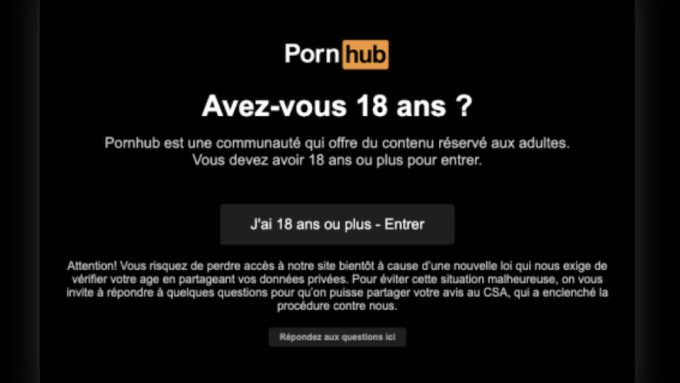PARIS — The seven top adult websites in France are being actively pressured by the country’s media regulatory agency, the Conseil Supérieur de l'Audiovisuel (CSA), to develop their own age verification systems under threat of closure.
Last month, the CSA — France’s equivalent to the FCC — sent a letter to Pornhub.com, xHamster.com, XVideos.com, XNXX.com, Tukif.com, JacquieEtMichel.net, JacquieEtMicheltv.net and JacquieEtMicheltv2.net demanding the activation of “an age-verification system” by March 16.
The deadline passed last week, with the sites in question posting notices on their homepages trying to inform the public of the government’s threats.
As XBIZ reported, during the weeks leading up to the March 16 deadline, the site Pornbiz.com — owned by tube site XVideos, a WGCZ company — began circulating a survey gathering public opinion about privacy concerns surrounding the requirement and its implementation.
“Last summer,” the intro to the XVideos survey explained, “a law about domestic violence was amended with two articles concerning the distribution of pornography online. It imposes age verification on the users.”
That amendment was adopted by an atypical “accelerated procedure” with a very small number of legislators present, following an initiative by President Emmanuel Macron’s government.
The intro to the survey points out that less than 10% of “députés” (Representatives) were present during the vote and none of the legislators were asked about the law’s consequences or the method of age verification to be employed.
“If you ask yourself, as we do, what does pornography have to do with domestic violence, you’d be given this explanation: people can be induced to see and then reproduce ‘violent’ sexual practices seen online,”
Threats of Fines, Closure and Search Engine 'Deprioritization'
The amendment, Article 23 of the domestic violence law, gives the president of the CSA the power to send a formal notice to any company or person “whose online activity allows minors to have access to pornographic content,” according to a report by Paris daily Le Parisien.
“The addressee of the injunction then has fifteen days ‘to present his observations’ in order to comply with the law,” Le Parisien reported. “If nothing is done after this period, then the president of the CSA can call the ‘president of the judicial tribunal of Paris’ to issue a judicial order to [the companies] that they ‘put an end to the access to this service.’ The offender risks three years imprisonment and a fine of €75,000. The amount is multiplied by five for companies — and this is the case here: a fine of €375,000.”
Although the deadline passed last Tuesday, the sites appear to still be active in France. It is unclear at this point if the judicial authorities have been contacted by the CSA to report the apparent non-compliance.
French legal experts also mentioned an intermediate step before total shutdown: having the CSA and a judge ask search engines to “dereference” or “deprioritize” the seven websites so they no longer show in search results.
A tech expert consulted by Le Parisien opined that “few technical solutions exist to block access to a public IP address such as a site. The State delegates this function to Internet service providers (ISPs). They then prevent the internet user from connecting to a domain name or to a server, even abroad, but it is long and tedious.”
AV Supporter: Law is 'Symbolic'
French legal experts also said that the law would encounter constitutional difficulties.
"It is a law that is hard to apply technically and it transfers a good part of the parental control responsibility to content hosts and adult-only websites,” tech attorney Claire Poirson told the daily. “The targeted site can also appeal against the judge's order and his lawyers can ask a priority question of constitutionality to check the legitimacy of this legislative provision.”
The widespread availability of VPN services also renders the supposed effectivity of many proposed AV systems obsolete.
One of the supporters of the amendment, Thomas Rohmer, admitted to Le Parisien that, “Of course teens are going to install VPNs.” But he considered the objective of his crusade as achieved because the teens “will know that it is illegal and that adults have put in place means of protection to tell them about it.”
“It is symbolic,” Rohmer added.






